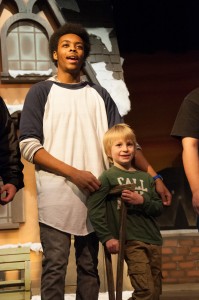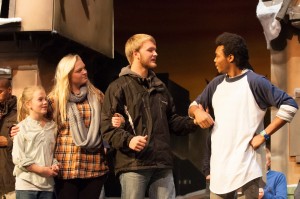
Jerry Spanos believed it when people told him he was mentally retarded. He accepted his fate to end up a failure, barely graduating high school with absolutely no aspirations of further education. However, Spanos served a mission for The Church of Jesus Christ of Latter-day Saints, where a companion told him of his worth and encouraged him go to college. This positive motivation spurred Spanos to turn his life around. Spanos’ change inspired him to open the Heritage School to give other at-risk youth a chance to prove themselves.
The Heritage School is a Provo-based nonprofit that helps students ages 12 to 17 who are struggling with psychiatric issues including depression and other mood disorders, schizoaffective disorders and substance abuse problems.
Heritage is considered one of the top youth treatment centers in the country for its effect on how mental illness is treated. In the past, mental illness was treated with a “behavioral-modification” approach that rewarded good behavior and punished bad behavior. This was intended to condition teens to adopt good behavior, but according to development theorists, can sometimes be damaging to the human spirit. Heritage school helped develop the principles of “relationship-based” therapy that emphasizes personal relationships as more important than any program.
“Heritage School was founded with the intent to treat the whole person — emotionally, mentally, and physically — with a special emphasis on the relationships in their lives,” said Kristi Naumann, therapist at Heritage School and BYU alumna. “By looking at the whole person, not just the behaviors, we bring a picture into focus for them on how they have the ability to strengthen themselves, their family, neighborhood and community.”
Heritage School does more than just help the youths in its care.
“Since we started in 1984, we have worked with many mental health professionals who have gone on to use the Heritage methods in their practices, some of them even opening their own facilities founded on the same principles Heritage uses,” said Mckaye Treanor, development director for Heritage School.
Heritage School offers its students unique and personalized treatment plans designed for each adolescent by a team of psychiatrists, teachers and therapeutic recreation personnel.
“Residents undergo an innovative, relationship-based therapeutic model that includes family involvement, relationship therapy, hard work and trust,” said Wyatt Semanek, spokesman for the school.
Students can choose from a variety of treatment options within the relationship-based therapeutic model. This includes a performing arts therapy program and an equestrian therapy program, where students learn to care for and ride horses. They can also participate in intramural sports, humanitarian groups and artistic clubs.

Heritage School uses these therapeutic models to help advocate for at-risk youth by helping families see their child’s issues as an illness rather than a behavior problem, said Treanor.
“Even in today’s culture, there are still those who view people with mental illness as a behavior problem, or ‘bad person,'” said Treanor. “We try to help people to see that mental illness is something that should be viewed like a long-term illness. Yes, it has effects that can be challenging, but with the right type of treatment it can be controlled, and people who are suffering from mental illness can live full, productive, happy lives. That is our goal at Heritage, to provide the youth in our care every tool available to be happy and successful.”
One way Heritage School accomplishes this goal is by inviting the community to visit the campus at a number of annual events.
“These activities expose the community to the realities of mental illness, and educate them that there is hope for those struggling with mental illness.” said Kevin Downs, therapy director at Heritage school, and BYU alumnus.




